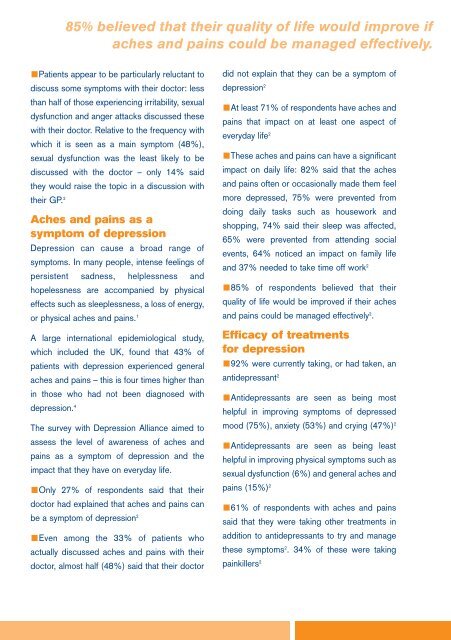Pulling Together - Seroxat Secrets
Pulling Together - Seroxat Secrets
Pulling Together - Seroxat Secrets
Create successful ePaper yourself
Turn your PDF publications into a flip-book with our unique Google optimized e-Paper software.
85% believed that their quality of life would improve if<br />
aches and pains could be managed effectively.<br />
Patients appear to be particularly reluctant to<br />
discuss some symptoms with their doctor: less<br />
than half of those experiencing irritability, sexual<br />
dysfunction and anger attacks discussed these<br />
with their doctor. Relative to the frequency with<br />
which it is seen as a main symptom (48%),<br />
sexual dysfunction was the least likely to be<br />
discussed with the doctor – only 14% said<br />
they would raise the topic in a discussion with<br />
their GP. 2<br />
Aches and pains as a<br />
symptom of depression<br />
Depression can cause a broad range of<br />
symptoms. In many people, intense feelings of<br />
persistent sadness, helplessness and<br />
hopelessness are accompanied by physical<br />
effects such as sleeplessness, a loss of energy,<br />
or physical aches and pains. 1<br />
A large international epidemiological study,<br />
which included the UK, found that 43% of<br />
patients with depression experienced general<br />
aches and pains – this is four times higher than<br />
in those who had not been diagnosed with<br />
depression. 4<br />
The survey with Depression Alliance aimed to<br />
assess the level of awareness of aches and<br />
pains as a symptom of depression and the<br />
impact that they have on everyday life.<br />
Only 27% of respondents said that their<br />
doctor had explained that aches and pains can<br />
be a symptom of depression 2<br />
Even among the 33% of patients who<br />
actually discussed aches and pains with their<br />
doctor, almost half (48%) said that their doctor<br />
did not explain that they can be a symptom of<br />
depression 2<br />
At least 71% of respondents have aches and<br />
pains that impact on at least one aspect of<br />
everyday life 2<br />
These aches and pains can have a significant<br />
impact on daily life: 82% said that the aches<br />
and pains often or occasionally made them feel<br />
more depressed, 75% were prevented from<br />
doing daily tasks such as housework and<br />
shopping, 74% said their sleep was affected,<br />
65% were prevented from attending social<br />
events, 64% noticed an impact on family life<br />
and 37% needed to take time off work 2<br />
85% of respondents believed that their<br />
quality of life would be improved if their aches<br />
and pains could be managed effectively 2 .<br />
Efficacy of treatments<br />
for depression<br />
92% were currently taking, or had taken, an<br />
antidepressant 2<br />
Antidepressants are seen as being most<br />
helpful in improving symptoms of depressed<br />
mood (75%), anxiety (53%) and crying (47%) 2<br />
Antidepressants are seen as being least<br />
helpful in improving physical symptoms such as<br />
sexual dysfunction (6%) and general aches and<br />
pains (15%) 2<br />
61% of respondents with aches and pains<br />
said that they were taking other treatments in<br />
addition to antidepressants to try and manage<br />
these symptoms 2 . 34% of these were taking<br />
painkillers 2


